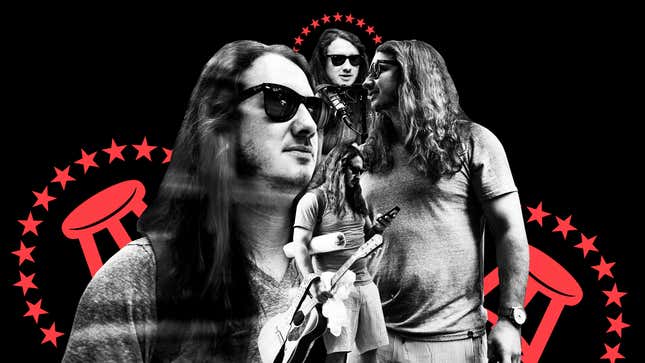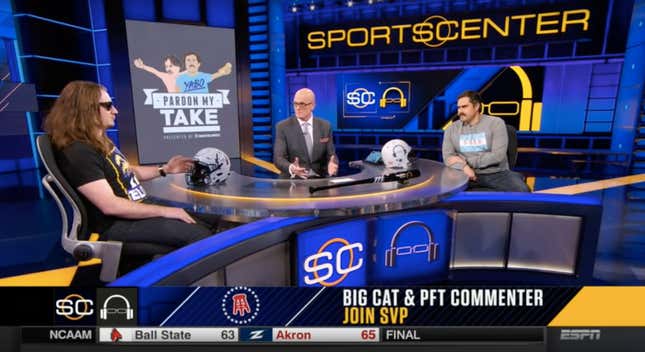
Every so often, some publication or other—often a fancy one—will run a fawning profile of PFT Commenter, the sports satirist who works for Barstool Sports and co-created the wildly popular comedy podcast Pardon My Take. These profiles are all more or less the same.
In 2016, there was this one from GQ (“Meet PFT Commenter and Big Cat, Two of the Internet-Famous Bros Behind Barstool Sports”); last year, Rolling Stone (“How Did PFT Commenter Become the Unintentional President of the New School in Sports Media?”) and Awful Announcing (“How Pardon My Take took over sports podcasting”) got in on the action; and just yesterday, the Washington Post boldly stepped in the footprints of those who came before them with “PFT Commenter rose from an internet ‘cesspool’ to podcasting glory. And no one knows who he is.”
The Post story reads as if you’d run its predecessors through an algorithm, keeping all the commonalities about how PFT Commenter is such a disruptor in the sports media space and how he has such a devoted fanbase and how he’s so clever—he calls Danny Woodhead “gritty”!—and how boy oh boy is he popular. Another requirement is being completely taken by the claim that precious few people know who PFT Commenter is, despite the fact that anyone with an internet connection and 30 seconds can easily find out his name’s Eric Sollenberger.
These knowing profiles have another commonality too, which that is that they all fail to understand PFT Commenter’s actual value—the very essence of why he matters so much to Barstool Sports—and thus their own subject. First, PFT Commenter offers a line of defense against detractors, an easy figure to point to while saying, “Barstool can’t be that bad. They have PFT Commenter, and everyone loves him!” (This defense appears to be working, thanks in part to profiles like the Post’s, which barely grazes over what Barstool is all about as it trips over itself to rewrite the company’s PR materials.)
Perhaps more importantly, though, the real value of PFT Commenter’s shtick imitating a dog-whistling, sexist, message-board idiot is tricking people—or at least certain people, whose opinions matter very much—into thinking that Barstool Sports is not in fact dominated by racist, neanderthal bullies who harass women online, videotape each other in the shower, and call underage girls hot, repeatedly, but is in fact some high-concept gag. This isn’t the thing itself, PFT Commenter’s presence proclaims, in the face of a mountain of evidence that it is. But we’re all in on the joke.
Sollenberger’s success—his massive, undeniable success—is also the one thing Barstool can effectively market to broader audiences. (Well, mostly; Barstool’s reputation still managed to ruin PFT Commenter’s deal for an ESPN show after the network decided it should distance itself from Barstool personalities, which have trafficked in racist stereotypes, joked about fucking one of their interns, joked about rape, and wondered whether it was okay for Harvey Weinstein to leverage his power for sex.) For all the money to be made off Pardon My Take podcast ads, PFT Commenter’s ultimate value might be the way he functions as a gateway for the ever-growing group of people you’d think would be above dealing with Barstool, but are willing to engage on account of the good business. PFT Commenter’s success provides a cover for NFL coaches like Sean Payton, comics like Kevin Hart, sports anchors like Scott Van Pelt, sports writers like Peter King, TV producers like Michael Davies, Twitter, Facebook, and many others to do business with Barstool, making the company a reliable platform for athletes’ and leagues’ messaging. Success, at a certain point, is its own respectability. (Sollenberger disagrees, saying, “I reject the premise that I provide cover for my company. I think our work speaks for itself and if you read any deeper into that, I think that’s misguided.”)

Most recently, Barstool reached a deal with a former NFL quarterback, who beat and threatened to kill his ex-girlfriend and who is now attempting to play in the Canadian Football League, to create a weekly podcast about his “comeback.” Naturally, there are already t-shirts for sale.
Neither the Post profile nor any of the others, though, pay any sort of attention to how PFT Commenter allows Barstool to launder its worst instincts through the character’s ironic detachment, nor do they even try to grapple with (let alone press Sollenberger on) how the PFT Commenter character—carefully curated over years to strike the pitch-perfect impression of an ignorant, macho, entitled white guy—is actually an apt front for exactly the stereotypes it supposedly mocks. It’s as if Stephen Colbert, to use an existing comparison, had taken his “Stephen Colbert” character to Fox News and enjoyed glowing press for doing satire at the network. And all these esteemed publications allow themselves to be suborned in the service of what amounts to kayfabe, for no particular reason.
Sollenberger used to completely avoid showing his face; now he takes selfies with fans on the street and appears on ESPN shows. He used to protect details of his private life; now he doles them out like so many bread crumbs in the pages of the Washington Post. He used to do interviews—like this Q&A with Mashable in 2015—in full character, complete with his patented misspellings. Now, he’s answering questions from the nation’s premier publications as himself, no trace of PFT Commenter anywhere.
Sollenberger has long maintained that he needs the “mystique” of his character to be successful, but by his own company’s standard this is not true. (Dan Katz, who goes by Big Cat, is the other host of Pardon My Take; his identity has always been known.) And his insistence on anonymity isn’t to hide some dirty past—he has no meaningful criminal record.
If Sollenberger has been basking in the public eye and conducting interviews as himself in the pages of national publications for years, and if his identity is easily found online, and if the central proposition of his routine—key to the value of an ever-more-popular sports-media property that wants very much to blur the lines between the real and the irreal—is that PFT Commenter is something entirely apart from the man who plays him, why do reputable journalistic entities continue to grant him anonymity? More importantly, why does he demand it? Sollenberger told me that he thinks the joke is funnier when he’s anonymous and that people like to suspend disbelief.
It could be that PFT Commenter wants to be anonymous because Eric Sollenberger doesn’t want his real name—his real life—to be associated with Barstool Sports. The disconnect is very useful, after all. For example, when the Washington Post lobbed a softball about Barstool having a reputation that some “might have considered juvenile, sexist and mean-spirited,” PFT Commenter, not in character and yet for some reason still reaping the benefits of anonymity, can answer like this:
“All I’d heard was a lot of the negative side,” he explained. “That’s what the Internet had put out there. People that weren’t in the Barstool universe, that’s the impression they had of the company. I checked the company out, read their blogs. I think they are one of the most hilarious collective groups of people writing right now.”
And what does Sollenberger think? Pretty much the same.
“I think there is something for everyone at Barstool, whether it’s Zero Blog Thirty, Mickstape, Pardon My Take, and you can make a call on what’s funny and that’s why it’s a great company, because you can have different perspectives. And as a consumer you can choose what shows you like, what you think is funny, and what you dont care for,” he said.
As for the other stuff—what exactly does he find hilarious about the president of his company harassing me for months on end? Did Sollenberger think it was funny when his boss said, about me, “I want to fucking take her out to Valentine’s Day and stick my tongue down her throat”?
“No comment,” he said, noting that he discourages harassment on his podcast.
In the end, this is why journalists don’t grant the subjects of profiles—or any sources, for that matter—anonymity for bullshit reasons: Because a subject might, for example, use it to spin the truth to protect a job and a fat paycheck. PFT Commenter never spoke up once about the racism or the misogyny of the company he works for, and why would he? He’s a character; he’s not real. Eric Sollenberger is, though.